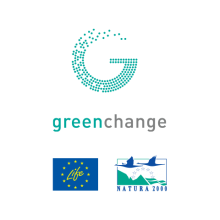Case study:LIFE GREENCHANGE (LIFE17 NAT/IT/000619) – Environmental restoration of the wet ecosystem along the Ufente river
This case study is pending approval by a RiverWiki administrator.
Project overview
| Status | Planned |
|---|---|
| Project web site | http://lifegreenchange.eu/en/ |
| Themes | Habitat and biodiversity, Hydromorphology, Social benefits |
| Country | Italy |
| Main contact forename | Fabio |
| Main contact surname | Zaccarelli |
| Main contact user ID | |
| Contact organisation | provincia di latina |
| Contact organisation web site | http://www.provincia.latina.it/flex/cm/pages/ServeBLOB.php/L/IT/IDPagina/1 |
| Partner organisations | Confagricoltura Latina; Poliedra - Politecnico di Milano; CIRF - Centro Italiano per la Riqualificazione Fluviale; U-Space s.r.l; MIEMA |
| Parent multi-site project | |
| This is a parent project encompassing the following projects |
No |
Project summary
This intervention is part of the project LIFE GREENCHANGE “GREEN INFRASTRUCTURES FOR INCREASING BIODIVERSITY IN AGRO PONTINO AND MALTESE RURAL AREAS” (LIFE17 NAT/IT/000619). In line with the objectives of the EU Biodiversity Strategy to 2020 and with the Communication from the Commission on Green Infrastructures, LIFE GREENCHANGE intends to contribute to halting the loss of biodiversity and to enhance the ecological value of the agricultural systems of the Agro Pontino and of the northern region of Malta, by planning and implementing Green Infrastructures and multifunctional actions in rural, semi-natural and natural areas.
In particular, this intervention consists of the Sub-action C3.3 “Redevelopment of planar environment with the creation of wetlands, hygrophilous and mesophilous woods, stable meadows”.
The area of intervention concerns a portion of the territory of the Pontine Plain and more precisely the stretch of the Ufente river between Sezze Scalo and the Gricilli area.
The aim of the intervention is to improve the conservation status of habitats and strengthen their function as reproductive and refuge sites for species of conservation interest by creating a mosaic of ecosystems due to the increase in local biodiversity linked to wetlands and to traditional rural landscapes.
- Vegetation choices: The works will consist in the re-naturalization of a rectified canal section replacing the infesting vegetation, thus eradicating the riparian vegetation currently consisting almost exclusively of Arundo donax and the subsequent planting of local species Quercus robur L., Alnus glutinosa L., Fraxinus angustifolia subsp. Oxycarpa, Ulmus minor Mill., Crataegus monogyna Jacq., Cornus sanguinea L., Euonymus europea L., Prunus spinosa L., Rubus ulmifolius Schott, Typha latifolia L. and Phragmites australis.
- Hydraulic design choices: The project also includes the redevelopment of the area through the construction of permanent wet lentic environments (two ponds, one smaller in the north-west area and another more important in the south-east area). In addition, six different areas are built in embankments, of which four are located between the two ponds and the other two outside towards the east and west borders. Trees and shrubs will be planted on these hills, but mainly Quercus rubur, Fraxinus oxycarpa and Alnus glutinosa. On two of these areas, two observation towers camouflaged in the surrounding environment will be built for observation of the area and the fauna. In the area surrounding the ponds and hills, a stable lawn will be built with a widespread plant of shrubbery to reconstitute a green infrastructure typical of agricultural areas of high natural value.
- Management: In accordance with the objectives of the LIFE GREENCHANGE project, the redevelopment of the Ufente river is also an opportunity to create economic development. In fact, the project area will be shared in its management with some operators in the livestock sector.
- Fruition: In accordance with the objectives of the LIFE GREENCHANGE project, attention was focused on the dissemination of the experiences and results of the project in such a way as to bring as many people as possible to the issues of biodiversity and the rational use of resources, in particular water way. Therefore, in the development of the final project the construction of two wooden observation towers of about 20 square meters was planned. each, to allow visitors interested in observing the birds that distinguish wetlands at various stages of the year.
Monitoring surveys and results
Lessons learnt
Image gallery
|
Catchment and subcatchmentSelect a catchment/subcatchment
Catchment
Subcatchment
Site
Project background
Cost for project phases
Reasons for river restoration
Measures
MonitoringHydromorphological quality elements
Biological quality elements
Physico-chemical quality elements
Any other monitoring, e.g. social, economic
Monitoring documents
Additional documents and videos
Additional links and references
Supplementary InformationEdit Supplementary Information
| ||||||||||||||||||||||||||||||||||||||||||||||||||||||||||||||||||||||||||||||||||||||||||||||||||||||||||||||||||||||||||||||||||||||||||||||||||||||||||||||||||||||||||||||||||||||||||||||||||||||||


